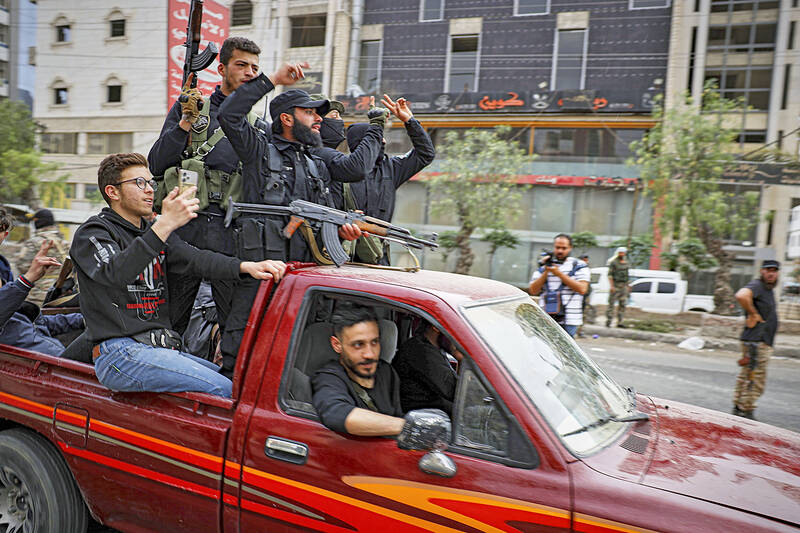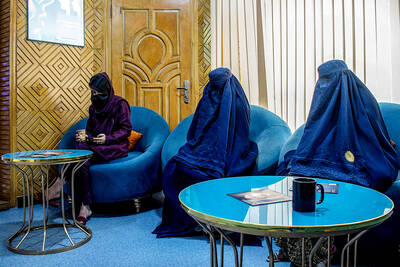Syrian estate agent Fahd Haidar shuttered his business and got out his rifle to defend his hometown of Jaramana when it came under attack this week by militants loyal to the new government.
Seven Druze fighters were among 17 people killed in the Damascus suburb as clashes raged from Monday into Tuesday, the Syrian Observatory for Human Rights said.
On Wednesday, the sectarian violence spread to the nearby town of Sahnaya, where 22 combatants were killed, the Britain-based war monitor said.

Photo: AP
Fourteen years after former Syrian president Bashar al-Assad’s bloody suppression of protests triggered a devastating civil war, Haidar said he feared a return to “chaos,” a slide into a “quagmire of grievances that will affect every Syrian.”
He appealed to the new authorities, who took over after al-Assad’s ouster in December last year, to step back from the brink and find “radical solutions” to rein in “uncontrolled gangs” like those who attacked his mainly Druze and Christian hometown this week.
In Jaramana, Druze leaders on Tuesday evening reached a deal with government representatives to put a halt to the fighting.
On Wednesday morning, an Agence France-Presse correspondent saw hundreds of armed Druze, some of them just boys, deployed across the town.
Behind mounds of earth piled up as defenses, Druze fighters handed out weapons and ammunition.
“For the past two days, the people of Jaramana have been on a war footing,” local activist Rabii Mondher said. “Everybody is scared — of war ... of coming under siege, of a new assault and new martyrs.”
Like many residents in the confessionally mixed town, Mondher said he hoped “peace will be restored ... because we have no choice but to live together.”
Mounir Baaker lost his nephew Riadh in this week’s clashes.
“We don’t take an eye for an eye,” he said tearfully, as he received the condolences of friends and neighbors.
“Jaramana is not used to this,” he said, holding up a photograph of his slain nephew, who was among a number of young Druze men from the town who signed up to join the new security forces after al-Assad’s ouster.
“We’re brought up to be tolerant, not to strike back and not to attack anyone, whoever they are, but we defend ourselves if we are attacked,” he said.

DEADLOCK: Putin has vowed to continue fighting unless Ukraine cedes more land, while talks have been paused with no immediate results expected, the Kremlin said Russia on Friday said that peace talks with Kyiv were on “pause” as Ukrainian President Volodymyr Zelenskiy warned that Russian President Vladimir Putin still wanted to capture the whole of Ukraine. Meanwhile, US President Donald Trump said that he was running out of patience with Putin, and the NATO alliance said it would bolster its eastern front after Russian drones were shot down in Polish airspace this week. The latest blow to faltering diplomacy came as Russia’s army staged major military drills with its key ally Belarus. Despite Trump forcing the warring sides to hold direct talks and hosting Putin in Alaska, there

North Korea has executed people for watching or distributing foreign television shows, including popular South Korean dramas, as part of an intensifying crackdown on personal freedoms, a UN human rights report said on Friday. Surveillance has grown more pervasive since 2014 with the help of new technologies, while punishments have become harsher — including the introduction of the death penalty for offences such as sharing foreign TV dramas, the report said. The curbs make North Korea the most restrictive country in the world, said the 14-page UN report, which was based on interviews with more than 300 witnesses and victims who had

COMFORT WOMEN CLASH: Japan has strongly rejected South Korean court rulings ordering the government to provide reparations to Korean victims of sexual slavery The Japanese government yesterday defended its stance on wartime sexual slavery and described South Korean court rulings ordering Japanese compensation as violations of international law, after UN investigators criticized Tokyo for failing to ensure truth-finding and reparations for the victims. In its own response to UN human rights rapporteurs, South Korea called on Japan to “squarely face up to our painful history” and cited how Tokyo’s refusal to comply with court orders have denied the victims payment. The statements underscored how the two Asian US allies still hold key differences on the issue, even as they pause their on-and-off disputes over historical

Decked out with fake crystal chandeliers and velvet sofas, cosmetic surgery clinics in Afghanistan’s capital are a world away from the austerity of Taliban rule, where Botox, lip filler and hair transplants reign. Despite the Taliban authorities’ strict theocratic rule, and prevailing conservatism and poverty in Afghanistan, the 20 or so clinics in Kabul have flourished since the end of decades of war in the country. Foreign doctors, especially from Turkey, travel to Kabul to train Afghans, who equally undertake internships in Istanbul, while equipment is imported from Asia or Europe. In the waiting rooms, the clientele is often well-off and includes men